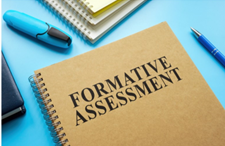
By
Aloysius Anyichie, Pan Zexuan, and Shelby Pellerin
December 2023
Print Version
What you need to know
Educators design assessment practices with the hope that students will learn from them to improve their learning. However, this is not always the case. For example, a summative assessment (i.e., assessment of learning) that evaluates student work at the end of learning points at the student’s current level of knowledge and has less information on the next level and how to get there. A formative assessment (i.e., assessment for learning) that happens throughout the learning offers lots of opportunities for students to make decisions on the required changes for improvement. However, students who do not perceive the value of these formative assessments may ignore acting on them. Thus, it is necessary to consider how instructors could design formative assessments that will engage students in regulating their learning by making the necessary changes to improve their learning.
Why this research is important
Self-regulated learning (SRL) is associated with student motivation, engagement, and achievement. Research has shown the potential of formative assessments (e.g., teacher and peer feedback and self-assessment) in supporting SRL. Less research has examined learning in specific contexts that embedded these assessment practices as students’ learning unfolds. Also, little is known about how pre-service teachers’ (PSTs) perceptions of formative assessments woven into their regular classroom assignments shape their engagement in SRL and the quality of their work. Additionally, more research is needed to understand how instructors could support SRL engagement by designing assessments for learning (e.g., co-constructing assessment criteria and standards with students, involving students in self-assessment and peer-assessment based on the analytical rubrics, offering instructors feedback, engaging students on personal reflection, and monitoring of their learning progress towards achieving the set standards).
How the research was conducted
This study employed a mixed-methods case study approach that involved an instructor and PSTs who enrolled in an Evaluation and Assessment online course (2022 winter term) at a public university on the West Coast of Canada. The instructor facilitated formative assessments by (1) creating opportunities for PSTs to offer and receive peer feedback, receive instructor’s feedback, and self-assess their work before final submission; (2) providing clearly described analytical rubrics for PSTs’ self-assessment; and (3) implementing retrospective surveys for PSTs’ reflection. Data sources included: (1) course documents (i.e., syllabus, assignment instructions, lesson notes); (2) PSTs’ self-reports on Experience Sample Reflection Form (ESRF); and (3) PSTs’ work samples.
What the researchers found
- All the PSTs were satisfied with the formative assessment practices designed and implemented by the instructor.
- All the PSTs found providing feedback to their peer’s work helpful in improving the quality of their work. Most of them indicated that they modified their work based on the peer feedback and the self-assessment before the final submission.
- Peer assessment was more helpful than self-assessment, but the combination of both was more powerful in improving the quality of their work.
- PSTs’ perceptions of the formative assessments were associated with their SRL engagement. PSTs reported high levels of engagement while completing peer and self-assessments, which may link to their positive perceptions of formative assessments. They showed overall high motivation, which may also relate to their positive perceptions of formative assessments.
- PSTs tended to be more engaged in peer assessment even though they showed higher motivation in self-assessment. Comparing PSTs’ work samples before and after formative assessments, PSTs regulated their learning engagement in their assignments by integrating peer feedback, assessing, and improving their work based on the rubrics.
How this research can be used
This study offers practical examples of how PSTs’ engagement in SRL could be nurtured by implementing formative assessments in teacher education programs. Specifically, it shows the benefits of combining quality feedback from instructors, peer and self-assessment to improve the quality of students’ work.
About the Researchers
Keywords
- case study
- engagement
- formative assessment
- pre-service teachers
- self-regulated learning
Publications Based on the Research
Zexuan, P. Anyichie, A. C., & Pellerin, S. (2023, May 28–31). Supporting pre-service teachers’ self-regulated learning engagement through formative assessment: A mixed-methods case study [Conference presentation]. Annual meeting of the Canadian Society for the Study of Education, York University, Ontario, Canada.
Editor: Christiane Ramsey
Read more BU Research
Research at Brandon University follows comprehensive policies designed to safeguard ethics, to ensure academic integrity, to protect human and animal welfare and to prevent conflicts of interest.



